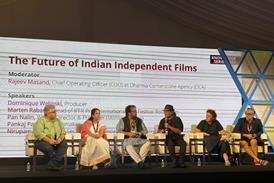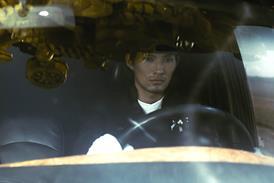It may not sound like a big shift from the vague predictions over the last few years that a digital future represented threats and opportunities.
But Moore's fear, shared by many at the conference in London, is not about an uncertain future but about what's happening now in the industry.
In simple terms, we are past the point of no-return and are now already in the digital era with little in the way of a safety net.
The opportunities are now clear. For the first time in the history of all film content creators and owners have an efficient and in many ways democratic means to reach consumers.
It is also clear that there are a very wide range of businesses desperate to help them in the process. Search engines, telecoms companies, even supermarkets want to facilitate the digital dream.
The competition between them 'stimulates innovation and ensures that products improve faster and become cheaper,' says one of the true pioneers of the change, Google chief executive Eric Schmidt.
Every day the evidence mounts that we are in a new age of unprecedented opportunity.
This week, for example, saw the first online premiere of a major Bollywood film, Vivah, extending the reach of the big opening to the huge Indian diaspora around the world. But we should not minimise the fear.
At heart it is about the gap between the so-far slow decay of an imperfect but working system and the establishment of a fully-functioning digital economy.
No one yet knows the size of the gap but it seems clear that major changes will happen in the enxt year.
Where's the money coming from'
The obvious place to start understanding that gap is with money. It's impossible to avoid the statistics that show how fast digital technologies, and particularly the internet, are growing.
But what such comforting statistics don't say is the hard revenue sums behing the percentages.
Moore says a recent Aardman series of online downloads for its Angry Kid series attracted 60 million hits - and yet it has barely wiped its face in financial terms.
More customers does not necessarily translate into more money and that naturally is unnerving.
The starkest contrast comes when comparing new media revenue projections with those of DVD, the rock on which a decade of growth in the film industry has been built.
Figures from analyst Screen Digest (see graphic) suggests that the level of revenue from DVD sales is likely to dwarf those of any digital platform for years.
The gap created by drop-offs in DVD sales needs to be made up if the growth curve of the last decade is to be sustained.
In the short-term, the task of new media platforms - along with HD discs - will be to try to hold up the levels of profit currently delivered from DVD sales.
It has some advantages. Online is the most efficient means to reach international audiences in currently under-developed parts of the world and that's where cinema has wanted to expand.
But the fear about replacing revenues is no paper tiger. The music industry demonstrates perfectly what can happen.
Film has a huge advantage over music in that it can see and hopefully learn from previous mistakes.
Nonetheless the primary source of fear remains that DVD sales fall faster than online puts them on - and indeed lower cost online sales accelerate the DVD decline.
What's my cut'
For many independent film-makers, the digital question comes down to a rather more pressing issue - where's my cut'
While the studios are able to use their collective muscle and economies of scale to leverage their share, how the independents profit is less clear.
Every market recently has generated a story of one film or other left on the table because agreement could not be reached on what the rights are worth.
Again the music industry highlights the problem. In the European Union, for example, online downloads of music are now worth $5bn Euros 3.9bn) a year but the independents' have struggled to make an impact.
Indies fear they will be left with noses pressed to the window while the big boys share the unquestioned potential of digital distribution.
They have a point in the short term. They are being asked by the new online distributors, rental services and sellers to hand over rights whose value is unknown.
Exclusive rights are currently being demanded as a bundled package.
Lisa McDonald, controller of acquisitions for pay and pay-per-view at satellite broadcaster BSkyB, says her company is taking a big gamble on creating new means for film to meet the market.
'We don't know how fast the change will come amongst the consumers who no longer want to use linear TV. It's the change in consumer habits and the speed of that change that is the key to development.'
It's only fair that content-owners should share that risk, is the message from broadcasters.
The answer for many independents will be either to go with the flow or to try to reinvent models.
There's a considerable amount of that innovation now around. 'This is an incredibly exciting time to be making films,' says Liz Rosenthal,
'The digital age has put film-makers and producers in a powerful position to experiment in finding audiences. They key is non-exclusivity and staying in control of your rights and revenues.'
It's easier said than done. Circumventing the system or creating new routes to market is a big undertaking.
Robert Greenwald has received international attention when he adopted an entirely fresh approach distribution, creating an audience for highly-political documentaries about the Fox news network and Iraq through screenings at house parties.
He's in no doubt that digtital technologies can level the distribution and marketing playing field: 'It's a good opportunity for people who have been shut out of the market by the gatekeepers.'
But he emphasises that every new method requires much harder work from film-maker and producer than any more conventional means.
Customer versus producer
What Greenwald proposes is a much closer relationship between content owner and customer, skipping a layer in the distribution process.
There are now plenty of examples of what's being called 'disintermediation' to see today.
What self-distribution among a few pioneering independents is doing is finding business opportunities in the biggest gap between the analogue and digital worlds - between customer and producer.
Technology has fuelled what might be considered a second revolution running parallel to and impacting upon digital change.
NewsCorp boss Rupert Murcoch summed it up succinctly in a recent speech: ''A new generation of media consumers has risen demanding content delivered when they want it, how they want it and very much as they want it'.
For the film industry, that represents a problem. Many of these demands could be met but it's not a deal that looks good to the producers.
The story over the last year for the studios has been experimenting with broadening consumer choice at something approaching the current economics.
Hence, the rather cumbersome download-to-own models in which a premium rate download to burn on a disc comes at a full DVD prices but the packaged DVD is thrown in to the deal.
One major motivation for adopting new models has been that consumers have been filling the gap between what they want and what the industry has been prepared to offer with pirated copies.
And so the studios are taking a three-pronged approach - supporting the development of copyright protection technology and, following the iTunes model, creating legitimate alternatives.
In each case, the trick is to lock in those who want to pay while minimising the damage caused by those who don't or won't.
The third part of the strategy is proving particularly tricky - legislation.
Legislating an on-demand world
Laws are intended to be a means of ironing out the contradictions between competing rights.
But the rapid evolution of copying technology and new media platforms, coupled with a much more demanding consumer represents a peculiarly difficult challenge for legislators.
There are advantages in following the music industry into the arena.
The agonising debate about who owns what are now being fought out by music companies - at the top end often parent or sister businesses of the film studios.
Much of the current emphasis is on how artists are compensated. In the US, it has already become a divisive debate and its become an international issue.
The European Commission is currently embroiled in an acrimonious dispute over whether to keep a levy on the manufacturers of any technical equipment that could be used for copying songs, or indeed films.
The money is redistributed to artists but is strongly opposed by the big manufacturers, who are keen to shift the emphasis to digital rights management (DRM) - technology which restricts the number of private copies a consumer can make.
But DRM is still at a relatively early stage and members of the European Commission legal affairs committee are calling for new rules in the area.
The real debate though comes down to a difficult balance between what the rights of consumers to use their copying ability and the rights of content makers and owners to profit from that copying or, where necessary to restrict it.
Austrian socialist MEP Maria Berger puts it clearly 'Mandatory rules really change things...otherwise the market will rule.'
The market has to an extent already spoken. The speed at which the technology has developed has forced the pace. The consumer question is 'Why can't I watch the DVD I bought anywhere I damned well please'' Is a difficult one to answer.
The film industry is therefore in danger of being cast as self-interested conservative trying to hold back the tide.
That's particularly damaging when the same legislation to protect the intellectual rights of film-makers and content owners can be used to suppress free speech,
At a recent Asian conference, University of the Philippines film professor Tilman Baumgärtel expressed the fears of many that ''restrictive copyright and anti-piracy laws tend to favour First World countries, in the process preventing artists from appropriating previous work for new creations.'
It's a powerful argument and one that highlights the international nature of the debate. One cannot effectively legislate for one country, or even for a large bloc of nations like the European Union.
Instead, much of the critical activity on digital rights is happening in diplomatic and trade talks.
The President of Ukraine, Victor Yanukovych, this week acknowledged the need for greater protection of intellectual property rights under pressure from governments.
'This is the path Ukraine must follow.'
Film in a digital age
A less practical discussion, though no less real, is the answer to the question 'what is film''
It's becoming a well-rehearsed observation: if post-35mm film is merely digital content, what distinguishes it from television or a ringtone.
Almost all the studios these days are now part of multimedia conglomerates with interests in a wide range of platforms.
Does it matter'
It does and that may prove to be a boon for the industry. suggests John Woodward, chief executive of the UK, Film Council and oddly that may be the big opportunity for theatres. 'The real issue is marketing,' he says.
The internet represents only a theoretical opportunity to reach billions. In reality, what matters is being seen and theatrical is still the most efficient way of making an impact on consumer consciousness.
Even when watching a film at home, the marketing and previous theatrical life clearly marks the content as film.
The recent release of Michael Winterbottom's The Road To Guantanamo almost simultaneously on television was still perceived ubnambiguously as a film.
The debate about closing windows between theatrical and other media showings may be less damaging than some suppose.
'Eventually, it will come down to releasing movies on a range of formats on the same say - internet, cinema, DVD, pay-per-view because this will give the consumer ultimate control over where they want to see their movies,' says Rupert Preston, executive producer at indie Vertigo Films.
But that can work in favour of the cinema.
'It's still the tried and tested method (of marketing) that works. There's no other strategy in place to tell people about movies.'
Right now, there's a strong push towards exploiting synergies between film and other media rather than the new supplanting the old.
A good example is Filmworks, a UK alliance between Sky television - part of the NewsCorp empire that includes Fox, and cinema chain Odeon.
The head of the distribution network is financing films to show on
Filmworks head Tony Miller
'It's about awareness to get people to the cinemas which is still the Holy Grail.'
It's perhaps also about changing the sometimes narrow definitions of what works in the theatrical market.
'Niche is becoming the new mass and (Filmworks) allows the distribution of projects that vary from the mainstream.
'The key for Sky and Odeon is to look for the gaps in the market, the best places to release certain films and take advantage of that so we may be able to do something for a film that might not have been considered for theatrical release.'






















No comments yet